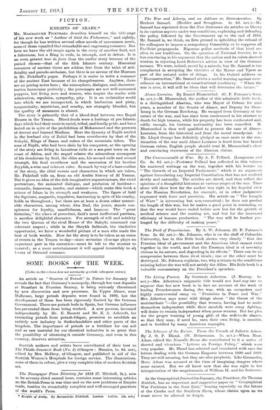FICTION.
KNIGHTS OF ARABY.*
MsaiscanuxE PicKmaxa. describes himself on the title-page of his new work as " Author of Said the Fisherman," and rightly, for though he has written several other novels of uncommon merit, none of them equalled that remarkable and engrossing romance. But here we have the old magic again in the story of another Said, not a fisherman, but a King in exile, in triumph, and in defeat. It is an even greater tour de force than the earlier story because of the period chosen—that of the fifth Islamic century. Historical romances of ancient times are seldom free from the taint of arti- ficiality and pseudo-archaism, but there is no savour of the Museum in Mr. Pickthall's pages. Perhaps it is easier to write a romance of the ancient East because of its changelessness. Anyhow, there are no jarring notes here ; the atmosphere, dialogue, and character- ization harmonize perfectly ; the personages are not well-costumed puppets, but living men and women, who inspire the reader with admiration, repulsion, sympathy, pity. It is an unfamiliar world into which we are transported, in which barbarism and piety, magnanimity, mysticism, and cruelty, are strangely blended, but the quality of meanness is absent.
The story is primarily that of a blood-feud between two Royal Houses in the Yemen. Blood-feuds were a heritage of pre-Islamic days which had their roots in racial, tribal, and family pride, and have lasted on in spite of the prohibition of Mohammed and the protests of devout and learned Muslims. Here the dynasty of Najah settled in the lowland city of Zabid had been overthrown by that of the Suleyhi, Kings of Sanaa and rulers of the mountain tribes. The sons of Najtih, who had been slain by his conqueror, at the opening of the story are living in luxurious exile at a sea-port town on the coast of Africa, and the sequel relates the miraculous reconquest of his dominions by Said, the elder son, his second exile and second triumph, his final overthrow and the succession of his brother Jeyyttsh, a wise and tolerant ruler. So much by way of a bare outline of the story, the chief events and characters in which are taken, Mr. Pickthall tells us, from an old Arabic history of Al Yaman. But it gives no idea of the rich imaginative superstructure, the vivid portraiture, the animated dialogue, and profusion of incident— romantic, humorous, tender, and sinister—which make this book a mirror of Islam in its strength and weakness. The figure of Said the Squinter, magnetic, impulsive, fascinating in spite of his cruelty, holds us throughout ; but there are at least a dozen other memor- able characters, among whom Abu Dad, the jester, stands con- spicuous for loyalty, unselfishness, and humour. The " great historian," the s lave of precedent, Said's most ineffectual partisan, is another delightful character. For strength of will and subtlety the two Queens of the rival House of the Suleyhi command our reluctant respect ; while in the Sheykh Sallimsh, the vindictive opportunist, we have a wonderful picture of a man who made the best of both worlds. How far the story is to be taken as an omen of events in the Yemen to-day—since sectarian cleavage plays an important part in the narrative—must be left to the student to unravel ; as a mere entertainment it will appeal irresistibly to all lovers of Oriental romance.


























 Previous page
Previous page